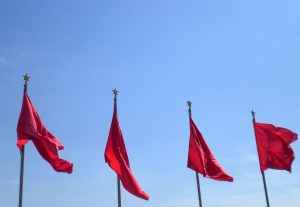The rise of the People’s Republic of China (PRC) as an emerging superpower is posing a range of new challenges to countries like Australia. When compared to the Soviet Union era, there is an entirely new and interactive terrain that is far more complicated to negotiate. While the PRC retains some of the behavioral patterns of the 20th century’s authoritarian regimes — paranoia, hyper-sensitivity, obsessive control — unlike the Soviet Union it has the global economic reach to be able to shift behaviors in other countries without direct or even indirect force. While internal coercion remains a prominent tool of control for Beijing, external coercion is becoming unnecessary for the regime as organizations are beginning to predict the PRC’s sensitivities and preemptively shift their behavior accordingly.
Last week in Melbourne there was a demonstration of this compliance: It was revealed that one of the city’s elite private schools, Caulfield Grammar, had abandoned its plans to name a new aquatic center after its former student and Olympic gold medalist, Mack Horton. At last year’s World Aquatics Championships Horton became a figure of scorn in China after his refusal to share the medals podium with Chinese swimmer Sun Yang, who had been suspected of using performance enhancing drugs. Yang had been banned for three months in 2014 for using performance enhancing drugs, and early last year a leaked report alleged that Yang smashed blood samples with a hammer after being visited by official testers. In November, Yang appeared at the Court of Arbitration of Sport in Switzerland to defend himself against these allegations. The result of the hearing has yet to be released.
Caulfield Grammar’s decision to not honor one of its prominent former students can be seen as one in which the school predicted a backlash from China due to the hostility that has emerged toward Horton. Instead the school sought to defend its financial interests. In 1998 the school became the first Australian secondary education institution to establish a footprint in the PRC with a campus in Nanjing that is linked to Nanjing Middle School. Since then it has also sent its Year 9 students (14-15 year olds) on a five-week, language and cultural immersion program at the campus’s boarding facility. These are positive initiatives that make a serious contribution to Chinese literacy in Australia, and Australian literacy in China. But they have clearly become problematic due to the nature of the Chinese government’s sensitivities.
For private organizations there is an understandable predisposition toward protecting their commercial interests, and this will often require making undignified decisions that factor in the sensitivities of the Chinese Communist Party (CCP), as well as the “grievance nationalism” the CCP ferments and which was on display during last year’s World Aquatics Championships. Although for educational institutions there should be an awareness about what values this kind of decision-making could be advancing. However, the behavior of these organizations has a way of aggregating to create a larger culture of compliance within the country, and this culture can influence and cloud the judgement of the state.
In an extraordinary decision, on Friday last week the government of the state of Victoria decided to shine the colors of the PRC flag across a number of Melbourne’s landmark buildings to demonstrate solidarity with Chinese-Victorians whose businesses had been (unfortunately and ridiculously) avoided due to the coronavirus outbreak. The impulse to demonstrate solidarity with the local Chinese community was a positive one, yet the way in which this was demonstrated was both strange and troubling.
The display was strange because there are a considerable number of Chinese-Victorians who are not from the PRC, and many of those who are could be assumed to have emigrated to Australia to get away from the CCP. The light show was troubling because by conflating the flag of the PRC with all people of Chinese background, the Victorian government was submitting itself to the CCP’s desire to be seen as the sole voice of all ethnic Chinese. Alongside this, it also suggested that the identity of people of Chinese background in Victoria was tied to the symbols of the PRC, rather than the symbols of Australia. At best this action was naïve, but the Victorian government is well-resourced enough that naivety should not be an excuse for its decision-making.
Both the incidents involving Caulfield Grammar and the Victorian government provide a good indication of how the influence of the CCP is exerting itself on Australia. These instances demonstrate how organizations second guess their own inclinations to factor in CCP sensitivities, how the party’s controlling ambitions can be normalized by the actions of other governments, and how these actions only embolden Beijing further. This, combined with the recognition that Washington’s current disengaging behavior might be its new normal, may force Australia to start making greater concessions to the rising regional hegemon, and in turn make these forms of compliance Australia’s new normal.

































